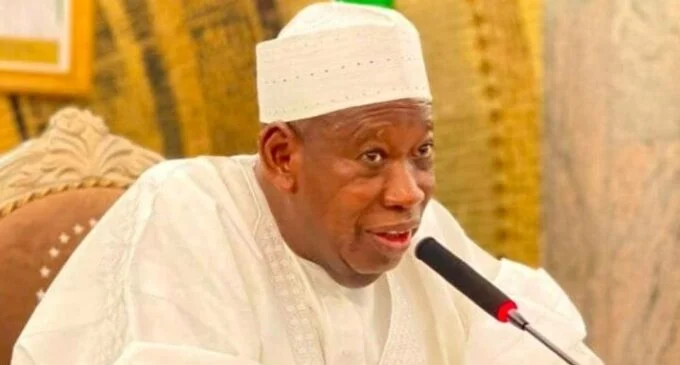Dije Abdu-Aboki, Kano state chief judge (CJ), has transferred the criminal case against Abdullahi Ganduje, national chairman of the All Progressives Congress (APC), to a new judge.
Before the latest development, the case was before Kano High Court 4 presided over by Usman Na’abba.
The case has now been transferred to High Court 7, sitting at Miller Road and presided over by Amina Adamu-Aliyu.
NAN reports that Baba Jibo-Ibrahim, the court’s spokesperson, said the office of the CJ has the power to direct and transfer a case at any stage before judgment.
The Kano government filed an eight-count charge bordering on bribery allegations, misappropriation, and division of public funds against Ganduje.
The former governor of Kano is to stand trial alongside his wife, Hafsat Umar; son, Umar Abdullahi Umar; and five others.
Other defendants in the case are Abubakar Bawuro, Jibrilla Muhammad, Lamash Properties Limited, Safari Textiles Limited, and Lasage General Enterprises Limited.
On April 29, the judge fixed May 16 to rule on an application by the prosecution seeking substituted service.
BACKGROUND
In 2018, the Daily Nigerian, an online newspaper, published a video of Ganduje allegedly receiving bundles of dollars from contractors, which he stuffed into his “babanriga”, a traditional outfit.
The APC national chairman was the governor of Kano from 2015 to 2023.
The newspaper said Ganduje requested $5 million as a bribe from the contractors who recorded the video.
In 2023, the Kano State Public Complaints and Anti-Corruption Commission (PCACC) invited Ganduje for questioning over the incident in the video.
The former governor did not honour the invitation and instead instituted a suit against the agency.
In March, a federal high court in Kano stopped the agency from inviting or questioning Ganduje over the bribery allegations.
The court ruled that the agency lacks the power to invite or investigate Ganduje over the allegations.
Abdullahi Liman, the presiding judge, said the alleged infraction is a federal offence that cannot be prosecuted by the state anti-graft agency.






